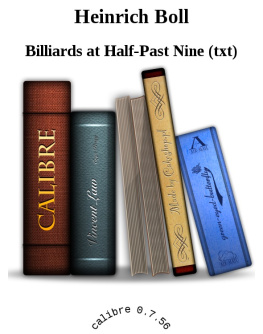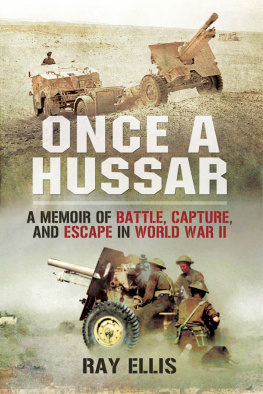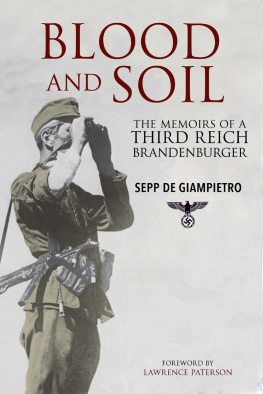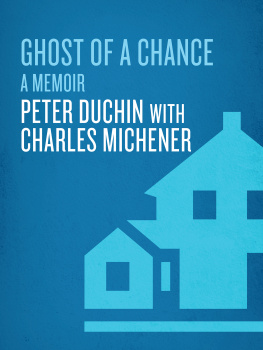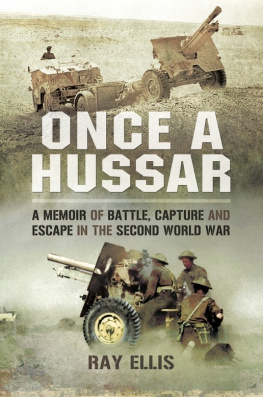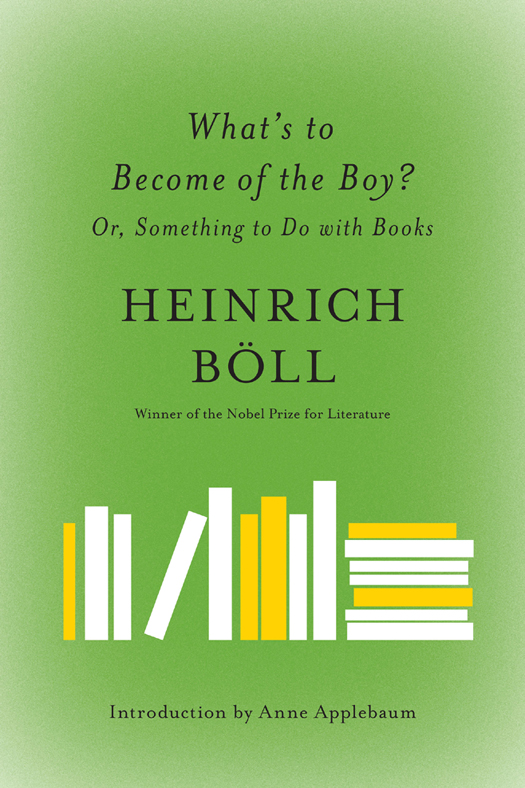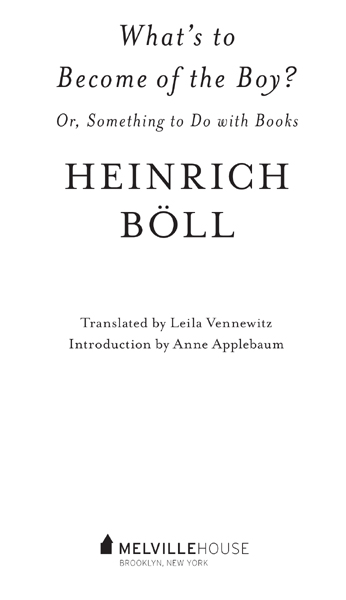HEINRICH BLL
In 1972, Heinrich Bll became the first German to win the Nobel Prize for literature since Thomas Mann in 1929. Born in Cologne, in 1917, Bll was reared in a liberal Catholic, pacifist family. Drafted into the Wehrmacht, he served on the Russian and French fronts and was wounded four times before he found himself in an American prison camp. After the war he enrolled at the University of Cologne, but dropped out to write about his shattering experiences as a soldier. His first novel, The Train Was on Time, was published in 1949, and he went on to become one of the most prolific and important of post-war German writers. His best-known novels include Billiards at Half-Past Nine (1959), The Clown (1963), Group Portrait with Lady (1971), and The Safety Net (1979). Bll served for several years as the president of International P.E.N. and was a leading defender of the intellectual freedom of writers throughout the world. He died in June 1985.
Anne Applebaum is a columnist for the Washington Post and Slate, and the author of several books, including Gulag: A History, which won the 2004 Pulitzer Prize for non-fiction as well as other awards. She has worked as the foreign and deputy editor of the Spectator (London), as the Warsaw correspondent for the Economist, as well as for several British newspapers. Her work has also appeared in the New York Review of Books, Foreign Affairs, and the Wall Street Journal, among many other publications.
The Essential
HEINRICH BLL
The Clown
The Safety Net
Billiards at Half-Past Nine
The Train Was on Time
Irish Journal
Group Portrait with Lady
Whats to Become of the Boy? Or:
Something to Do with BooksA Memoir
The Collected Stories of Heinrich Bll
Translators Dedication
My warm thanks to my husband, William,
whose skill, knowledge, and patience have
contributed so much to this translation.
Leila Vennewitz
Whats to Become of the Boy?
Originally published in German as Was soll aus dem
Jungen bloss werden? by Lamuv Verlag, Bornheim 1981
Copyright Lamuv Verlag GmbH., 1981
Copyright Heinrich Bll and Leila Vennewitz, 1984
Introduction Anne Applebaum, 2011
All rights reserved
First Melville House printing: October 2011
Melville House Publishing
145 Plymouth Street
Brooklyn, NY 11201
www.mhpbooks.com
eISBN: 978-1-61219-011-2
A catalog record for this book is available from the Library of Congress.
v3.1
CONTENTS
INTRODUCTION
by Anne Applebaum
INTRODUCTION
by Anne Applebaum
This is a memoir of Heinrich Blls school years. Or rather, it is a memoir of the years 1933 to 1937, when the Nazi party was consolidating its grip on power in Germany, civil society was being dismantled, mass arrests were devastating the political class and, aside from all that, Heinrich Bll went to school in Cologne. School? Oh yes, that too, he writes at one point, before addressing another subject. Yes, schoolI assure you Ill get back to that, he adds later, before delving once again into stories of how his anti-Nazi family learned to live under Nazi rule.
This is not, in other words, a traditional German bildungsroman, a memoir of childhood and youth. Though Bll makes glancing references to the bullies, girlfriends, eccentric teachers and other characters of the sort who usually loom large in recollections of adolescence, they are not his central focus. And when he does bring them up, they are inevitably colored by the historical moment. The child Bll dislikes is the one who joins the SS. The teacher he admires is the one who asks his pupils to correct the grammar in Mein Kampfa task implicitly insulting to the author of Mein Kampf. In his Latin class he is captivated by the work of Juvenal, because his descriptions of arbitrariness, despotism, depravity, corruption of political mores, the decline of the Republican idea carry echoes of the world around him.
But the real drama of this autobiography lies not in school but elsewhere, in the story of how Bll, his parents and his siblings coped with the rise of a totalitarian regime. His parents were liberal Catholics. His mother hated Hitler from the beginning, and referred to him as turniphead. His father was a pacifist who had dodged Verdun by simulating an attack of appendicitis on the eve of the battle. Bll exempted himself from the Hitler Youth, and had to come to school every Saturday to carry out community service instead. He never asked the other boys what happened at the rallies he didnt attend, because, he writes, he was too scared. He dealt with the political pressures of school by frequently playing truant. He wandered the streets of Cologne all day, with the tacit approval of his mother, who understood perfectly why he needed relief from school.
Blls family were not Nazis, but they were not heroes or resistance fighters, or even especially brave or defiant. In Hitlers Germany, this middle line between collaboration and resistance was not so easy for ordinary people to walk. For refusing to join the regime, the family paid a high price, living at the edge of poverty, counting pennies and arguing over whether a pair of stockings could be considered a legitimate expense. But material survival took priority over political survival, and his parents went to great lengths to make sure the family could eat.
The family also knew its collective lack of enthusiasm was dangerous, particularly for Blls father, whose businesshe was a cabinetmaker and sculptordepended on government contracts. Feeling that at least one of them ought to toe the line, his parents appointed Blls brother Alois to join the Storm Troopers. Alois resented this for the rest of his life. He suffered, he really suffered from those mob parades and route marches, writes Bll, who once slipped Aloiss platoon leader a pack of cigarettes to persuade him to overlook his brothers frequent absences.
These kinds of reluctant compromises were surely made by many Germans living under Hitler, far more than we usually assume. In most totalitarian societies, a small portion of people are enthusiastic fanatics, a small portion are brave opponents, and the vast majority want to make sure their children eat dinner every day and graduate from high school. Nazi Germany was no different. Quiet displays of Catholic faith were the only public form of rebellion the Bll family permitted themselves: We ostentatiously took part in the penitent pilgrimages of the men of Cologne, Bll writes, tolerated by the Nazis and watched by informers. In private, they cursed Hitler and his thuggish friends with what Bll describes as arrogance, mocking them and telling jokes.
Whats to Become of the Boy ends when Bll finishes schoolat laston the eve of the outbreak of war. Afterwards, he went to work at a bookstore, but not for long. He was soon drafted, and spent six miserable years in the Wehrmacht before deserting in 1945. His first novel drew heavily on these military experiences, and won him instant fame. From the 1950s onwards, Bll was known as a writer of Trmmerliteraturthe literature of the rubblebecause his writing focused on the war, the aftermath of the war, and the impact of the war on German society and the German psyche. In his lifetime, he was one of the most famous advocates of


